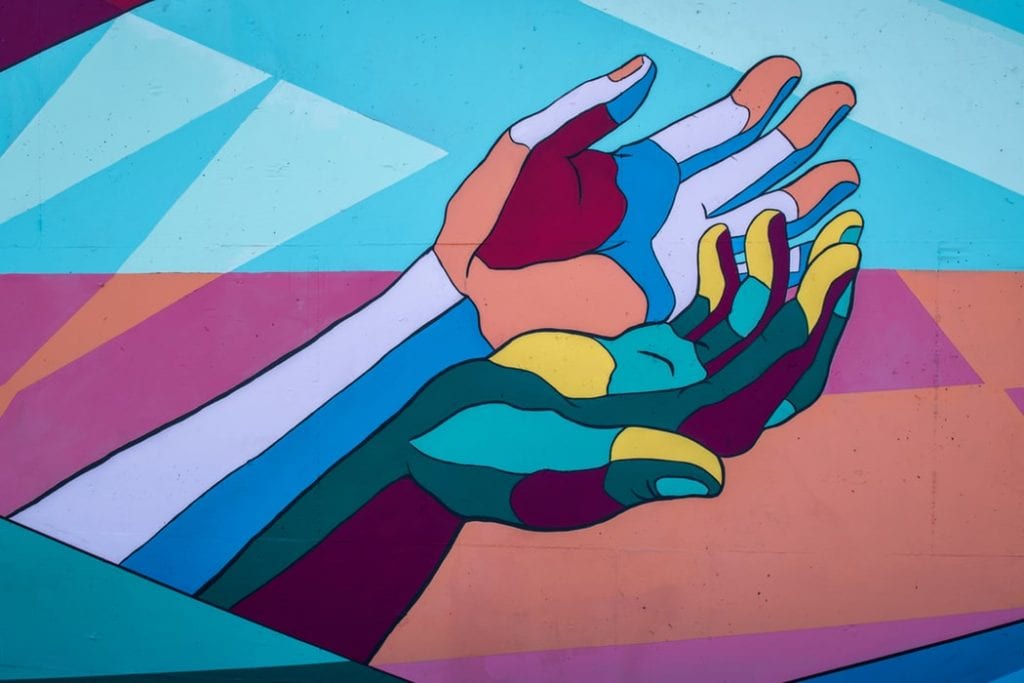Members of the Circle of Wine Writers take a look at their regions, or regions to which they have recently travelled, to share some insight into how the wine world is coping with Coronavirus and the impact of lockdown and social distancing on their businesses.
A letter from the Editor:
Well, hasn’t life as we know it changed in the last month? Last month, we were beginning to cancel events for the coming weeks, in the UK at least, and now the diaries have been cleared until at least July and we aren’t allowed to leave the house. Many of the countries our members are living in are in a much tougher police-enforced lockdown, while most are in some sort of quasi lockdown relying on citizen compliance, and a couple of others – notably Sweden and Japan – are carrying on with some semblance of normality.
For these strange and unprecedented times, I didn’t feel a normal Circular issue would feel quite right. So instead I’ve asked some members from around the world to share with us what is happening to the wine community and drinks industry there. From winemakers being told to stop making wine mid-harvest and drinks companies changing their production to hand sanitiser, while the on-trade grinds to a complete halt, it’s been a rollercoaster ride for the industry in the last month.
This is a global pandemic and I believe the only way out is to work together as a global community, many shining examples of which can bring us great hope already. Medical research teams are working internationally and sharing intel to try to find a vaccine; donations and volunteers to help health systems and the disadvantaged have poured in from all corners of society; and although we are experiencing physical isolation, I don’t think the world has ever felt quite as connected online with record-breaking numbers of video calls, chats and even virtual wine tastings.
Although the wine industry is haemorrhaging under the strain of restaurant and bar closures, the cutting of marketing and staff budgets, and increasing trade restrictions; some markets are reporting that wine consumption has in fact gone up over the last month. (Although the businesses profiting from those sales are limited to mainly supermarkets and online retailers.) Despite all the doom and gloom surrounding us – there is still some joy to be found in the transcendental power of wine and its ability to transport us to its place of origin (at least in our imagination) and soften the stress of this hard time. There’s perhaps more reason than ever to pour yourself a glass of wine, pick up the phone and reconnect with a distant friend.
There’s no doubt that the world will never entirely recover or return to how it was before COVID-19. And while change always brings pain, it also brings growth. Here’s hoping we can find a positive direction in which the wine industry can grow through all this.
– Amanda Barnes
EUROPE
Italy
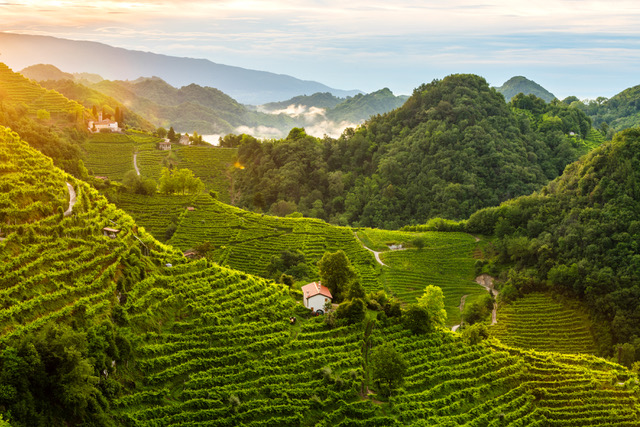
Michèle Shah reporting from Tuscany in Italy, one of the worst affected countries by the virus so far, and shares the perspective from an industry and nation which has been living with the virus and its effects for much longer than most.
 Italy was the first European country to be gripped by Coronavirus. It’s lockdown which was imposed on a national level on 9th March has led to many sectors having to adjust to the safety measures, logistics and economics of a totally new existence.
Italy was the first European country to be gripped by Coronavirus. It’s lockdown which was imposed on a national level on 9th March has led to many sectors having to adjust to the safety measures, logistics and economics of a totally new existence.
Agriculture is one these sectors. In fact, it is one of Italy’s main sources of GDP. Food and wine exports equate to some 50% of production and €44 billion in export value, of which its wine business is said to be worth €6.4 billion.
Recent concerns include the quantities of wine that are resting and still stocked in the cellars of wineries waiting to be bottled and the thought of a new harvest this autumn, which could mean that producers would not be able to fit the usual quantity of wine into their cellars. While one appellation is already being warned to cut down on quantities, others are already considering distillation measures.
“It’s still too early to say. However, from the data we have we know that there are 59 million hectoliters of wine in stock in Italy. Considering that a standard vintage produces about 44 million hectoliters, we have more than one vintage, almost a year and a half, in stock, says Andrea Sartori, president of Consorzio Valpolicella and CEO of his family winery, Sartori, in the Valpolicella area. According to Sartori, the largest stocks are in Veneto, which has a quarter of the total, followed by Puglia and Emilia Romagna. “It is clear that table wines and generic IGT will be preferred for distillation, however, I would not be surprised if Pinot Grigio or Prosecco DOC have the same problems. It is a serious matter and I honestly do not know how, from a technical point of view, Europe and the ministry will deal with the matter.”
The risk for the wine trade (and hospitality sector) is a recession. “Wine tourism, especially important to Tuscany, is already completely blocked and what is lost, is lost forever and not recoverable in the coming months. The economic and financial consequences will bring some wineries to their knees,” says Francesco Ricasoli, CEO of prominent Chianti Classico estate Castello di Brolio. This is a scenario that is worrying many wineries across Italy’s 20 wine-producing regions. The hills of Conegliano Valdobbiadene Prosecco Superiore DOCG, known for their breathtaking landscape and heroic viticulture, had great expectations for wine tourism this year, as a new UNESCO World Cultural Heritage destination, “All those who booked to come to our beautiful hills have had to cancel,” says Giancarlo Moretti Polegato, president of Villa Sandi’s premium Prosecco estate.
Trade shows worldwide have been postponed and cancelled as governments have imposed strict measures to slow the spread of Coronavirus. Vinitaly, Italy’s largest trade show which had initially been postponed, has been cancelled after much debate. The trade is hoping that events, tastings and press trips will pick up again during the summer months.
Not surprisingly, supermarket wine sales have risen sharply over the past two weeks under lockdown. Reports have shown that depending on the category of wine, there has been between a +11% and +17% increase in sales for IGT and DOC/G wines, while fortified wines and passitos have dropped by -15.7% and champagne even further by -53.2%. Online wine sales have shot up despite the difficulties of logistics of home deliveries. Lockdown also means the closure of Italy’s vibrant restaurant trade reducing the consumption of premium Italian wine.
Looking on the brighter side, Italy is still exporting its wines globally, however, delivery and shipments have slowed down considerably. According to Renzo Cotarella, CEO of Tuscany’s flagship winery, Marchesi Antinori, shipments to foreign countries are in difficulty. Transport on wheels, has the additional problem of long queues, the safety of drivers and possibly the observance of quarantine. “Yet there is a strong empathy for Italian wine,” assures Ricasoli.
Looking ahead, there is concern regarding the tightening of borders preventing the employment of visiting workers. A quarter of Italy’s agriculture depends on foreign workers and that includes vineyard work and harvesting under – the latter is fortunately still some months away.
According to Coldiretti Associazione (Farmers’ Association), agriculture legally employs some 370,000 overseas workers annually.
A positive outlook comes from Gaia Gaja regarding the future of Italian wine, which she says will prevail thanks to Italy’s model and the efficacy of family wineries, which are more flexible. In this moment of need, where manpower may be essential to keep things running, she believes family members will strive to unite to keep their vineyards and cellars working.
…..
Spain
 Amaya Cervera and Yolanda Ortiz de Arri report from Spain, which is one of the countries worst hit by the virus in terms of the death toll and confirmed cases of infection. You can read more of their reports on how the crisis is affecting the industry at Spanish Wine Lover.
Amaya Cervera and Yolanda Ortiz de Arri report from Spain, which is one of the countries worst hit by the virus in terms of the death toll and confirmed cases of infection. You can read more of their reports on how the crisis is affecting the industry at Spanish Wine Lover.
The Spanish government declared a state of emergency on 14th March, which meant the immediate closure of all bars and restaurants in a country where the on-trade accounts for half of total wine sales. With tougher restrictions in place since 29th March, wine can only be purchased in local supermarkets and through online stores.
Wineries are facing payment defaults, shipment delays and cancelled orders, yet they are carrying out essential work in their vineyards and cellars and most of them are able to supply wine normally.
Wine tourism has come to a halt. Losses are expected to be significant given that Easter is one of the busiest times of the year. Workers are also having to accept temporary redundancies at wineries, merchants, distribution companies and in the hospitality industry.
The coronavirus outbreak has come at a challenging time for the Spanish wine industry, already suffering the effects of Brexit and the US tariffs.
“Growth in home consumption won’t be enough to replace what is being lost. The best-case scenario would be a recovery in the second half of 2020 to compensate for the losses,” says Rafael del Rey, director of the OEMV (Spanish Observatory of Wine Markets), who forecasts that the duration of this crisis will determine its magnitude and also which businesses are able to pull through.
“We have to get used to black swans and the high volatility of all kinds of unpredictable events,” adds Miguel Torres Maczassek. Cvne’s Víctor Urrutia thinks that “the closer you are to the customer, the better; more so in difficult times”. For Emilio Restoy Cabrera, CEO of Zamora Company (owner of Ramón Bilbao), this crisis is going to force them “to rethink” their supply chain, referring to the fact that a large part of their winemaking equipment is Italian. Small vignerons like Roberto Oliván (Tentenublo, Rioja) feel that “the chain has broken and we come last in the pecking order”.
On the positive side, China and Japan are placing orders, confirms José Luis Benítez, director of the Spanish Wine Federation (FEV) and online wine sales are soaring during the lockdown. Many online wine retailers are also reporting a drop in the average price per bottle and growing demand for everyday wines.
According to distributor Ramón Coalla, who also sells fine food and wine from independent producers at his stores, “consumers are returning to classic regions. It also happened in 2008, when a great deal of the efforts to promote the emerging regions of that time were lost”.
The crisis is also changing the way wineries view online retailers. “We were seen as a necessary evil, but online sales will emerge stronger for maintaining wine consumption, as opposed to other channels which have collapsed,” says Toni Vicens of Vinissimus.
A wealth of initiatives have sprung up during the lockdown: virtual tastings, solidarity gestures, free online content… Instagram is booming with talks and tastings to the point that SWL has converted its usual wine lover agenda into a compilation of virtual events.
Beyond the economic consequences, the virus is sadly taking many lives. The Spanish wine industry mourns the loss of Carlos Falcó, 83, Marqués de Griñón, who died of Coronavirus on 20th March at a hospital in Madrid. He was a great pioneer who brought New Word viticulture techniques to Spain and boosted quality wines in Castilla-La Mancha.
…..
Sweden
 Fredrik Schelin reports from Sweden, one of the few countries that remain without free movement restriction. He shares his perspective from the ground and interviews key industry businessmen on the impact Coronavirus is having, even without a lockdown in place.
Fredrik Schelin reports from Sweden, one of the few countries that remain without free movement restriction. He shares his perspective from the ground and interviews key industry businessmen on the impact Coronavirus is having, even without a lockdown in place.
Sweden has, unlike many other countries, not applied any lockdown. Yet!
Most measures are voluntary in Sweden since the community is built upon trust between the government and the people. Primary schools are open, in order to avoid healthcare staff having to stay at home to take care of their kids. Swedish constitution mandates that the relevant expert agency, the Public Health Agency, rather than politicians must initiate any actions to prevent the virus. On the agency’s recommendation: the government has limited freedom of assembly, temporarily banning gatherings of over 50 individuals and physically closed secondary schools and universities. The Public Health Agency and government have issued recommendations to work from home, if possible; for people about 70 to stay at home; and have issued general recommendations to avoid unnecessary travel within the country and to keep a social distance between people. Those with even minimal symptoms which could be COVID-19 are recommended to stay home.
Restaurants and bars are open, but with a maximum number of 50 guests, who must be seated with a minimum distance of 1.5m between tables. No ordering or consuming standing at the bar, or queuing at the bar, are allowed. Restaurants are really suffering, as almost everyone who can is working from home. This has led to many restaurant owners almost closing down.
As we have a monopoly, there has been an increase in the sale of wine and spirits in the stores. Instead of going out to restaurants, people tend to stay at home and treat themselves with good wine and food. But the next level of this problem is when we run out of stock due to no delivery from wine-producing countries. We have not seen the end of this crisis yet.
Perspectives from Swedish businesses
Jonas Öhman is Nordic sales manager for Wine & Beer at Arvid Nordquist HAB, a coffee producer and Nordic sales and marketing company for its own and others’ brands in the areas of coffee & tea, wine & beer, food and non food.
The impact of Covid-19 has drastically changed the day-to-day focus for our business. The on-trade channel is suffering dramatically and some customers are already close to bankruptcy. In the off-trade, sales are booming, especially those of mid- to entry-level wines and Bag-in-Box, whilst super-premium wines, non-alcoholic wines and champagne have seen a decline. With this rapid and unforeseen increase of demand, our focus right now is to secure supply from our business partners all over the world.
Challenges lie in lower production capacity, closures due to quarantine, and lockdown of a whole country, i.e South Africa. But it does not stop there, the whole supply chain in Europe is also affected – roads, borders, and ports, etc.
At our company, the IT infrastructure is good and the majority of my team works from home. We have daily checkpoints in the Ms Teams platform, not only internally but also with our customers and producers all over the world. One thing is evident, changes happen by the hour and clear priorities, the ability to act swiftly and instant communication have never been more important than they are today.
Daniel Fritzdorf works at Stockholmsmässan, the largest exhibition facility in the Nordic region:
“Being the organiser behind the major food and beverage events in Sweden, we are extremely affected but are planning new dates for GastroNord. The HoReCa [off-trade] business is at an all-time low due to limitations in the society which will affect the business drastically with many tragedies to follow. Still business must go on and we ourselves are planning for a wine prize ceremony tomorrow with all major importers to receive medals and wine prizes. This is the same day that GastroNord would have started but it has been moved to 20-22 October when we hope to create a feeling of light at the end of the tunnel for the business. We need to remember that despite the tough times people will need good food and drinks more than ever after this period of Corona crisis. And this will of course create good business opportunities for the ones that have managed to cope financially.
…..
Finland
 Timo Jokinen shares his perspective from his native Finland, where wine businesses have been in lockdown since March.
Timo Jokinen shares his perspective from his native Finland, where wine businesses have been in lockdown since March.
Coronavirus has hit Finland heavily, especially in the on-trade business. The Finnish government has decided to close all restaurants, clubs, bars and coffee shops until 31st May at least, only allowing take-away. Food delivery companies have taken huge advantage of this situation and some, like Wolt and Foodora, charge 28% of the bill. This puts restaurants in an even more complicated position. But, as also most of the offices are closed and people are working from home, there are not many people on streets…
The effects of Coronavirus on the wine trade have been significant. Finland has a government monopoly on retail via ALKO and restaurants never had permission to sell wine outside of the premises. And now, as no one can go into premises, wine bottles will be dusty within weeks. All possible wine events and wine tastings have also been cancelled.
The opposition tried to convince the government to make an exception during this period, but instead of releasing wine sales there is now discussion about even closing the monopoly shops. The reason for this is that politicians and their assistants consider that free-flowing alcohol brings more home violence and crime.
There is a lot of discussion over this issue and the most dramatic polls consider that at least some hundred restaurants will lose their business and thousands of people their jobs. This will definitely impact wine sales and we’ll need to be very active with tastings and wine dinners after all of this is clear.
Most people are staying at home or in their summer houses in the woods and have filled their kitchen with food and drinks. The most simple food and cheapest wines are flowing.
A local business perspective
Pannee and Gina are owners and managers of the Winebridge restaurant in Tampere, which opened in July 2018 and was only just getting on its feet when this crisis hit. By mid-March the restaurant had 32 corporate events cancelled and within the next five days all the rest of their events and bookings were cancelled until July. Their restaurant also has a Wine School and Cooking School facilities, and all these activities have been cancelled since 21st March.
As Pannee tells me, the most difficult part of this situation is that nobody can tell and estimate when all will be normal again. This not only makes for a financial crisis, but also a mental crisis.
“The 5th Tampere Wine Fest has also been postponed, as have many such events all over the world. We will just see how everything goes after things get better, as hundreds of events want to have new dates, and we can not join all possible events of course. When I talk to wine importers, they all have the same message… stocks are full and wine is not moving.”
…..
France
 Jim Budd finds himself locked down in the Loire, where frost at the moment is just as great a threat to winemakers as Coronavirus.
Jim Budd finds himself locked down in the Loire, where frost at the moment is just as great a threat to winemakers as Coronavirus.
We arrived in Touraine on 4th March for a three week stay in the shared house we have in a small commune in the Cher Valley to the east of Tours and not far from Chenonceaux.
We usually come out to the Loire in either February or March. In this instance our timing had been dictated by my invitation to the Concours Mondiale de Sauvignon Blanc being held in Blois from 5th to 7th. As the Coronavirus threat became clear I became increasingly queasy about this Concours, which would have judges from various parts of the world. As soon as Prowein was cancelled, I decided that I would duck out of the Concours, which duly went ahead and as far as I know luckily none of the participants caught the virus. But I wasn’t prepared to take the risk.
Our village has a micro community vineyard – the first 150 vines were planted last April, so time on Saturday 7th to get together and prune them. There were a few of the traditional handshakes but it was mostly waving hello or touching elbows.
Fast forward a week as the threat grew. Late Saturday night (14th March) the French Government announced the immediate closure of all bars, cafés and restaurants. No French Sunday lunch – truly a crisis!!
However, the first round of the French Municipal Elections went ahead on the Sunday. I wonder how many people were infected either during the vote or in the counting that followed…..
Next day – Monday evening – President Macron announced the lock down to start from midday the following day. The difference between Macron’s delivery of his speech looking directly at the camera and Boris Johnson’s rambling speech the same evening was marked.
He announced that every time you left your house you would have to take a self-signed document (Attestation de Déplacement Dérogatoire) stating which of the limited range of reasons for being out qualified. If stopped by the police without you attestation or they are satisfied that you are out for good reason then fines start from 135€. 359,00 fines have been issued in the first 15 days of the lockdown. On Friday 3rd April the police made 460,000 checks across France.
The day of the lockdown I saw Kévin Vigné, director of the increasingly good Cellier de Beaujardin cooperative of Bléré. He was worried. “70% of our sales are from our shop. I’m not sure we can stay open.” The coop shop stayed open for a few days but is now shut.
Fortunately viticulture along with the rest of the farming sector is classified as essential so there is no restriction on working in the vines. Carine Simoneau of the Paris-Simoneau domaine in nearby Saint-Georges-sur-Cher told me: “Work continues in the vines but our workers keep themselves apart – only one person in a row and often one per two rows.” This practice has been confirmed by a number of other producers.
In the vineyards frost rather than Coronavirus is the most pressing concern. Parts of the Loire have been hit to varying degrees by spring frosts in three of the last four years – 2016, 2017 and 2019. Understandably another frost this year is a very pressing concern. The winter has been mild and bud-break started in much of the Loire before the end of March.
When we first arrived in early March the ground was saturated due to heavy and persistent rain, which continued for several more days. Then the wind swung to the east and north and the ground rapidly dried up, which proved to be very fortunate as on 26th March onwards frosts threatened with temperatures dropping below zero on several nights. However, with the ground being so dry and the humidity very low, ice didn’t form around the young buds, so they weren’t burnt by the sun in the morning. Often it is the morning sun that destroys the buds and young leaves with the surrounding ice acting as a magnifying glass.
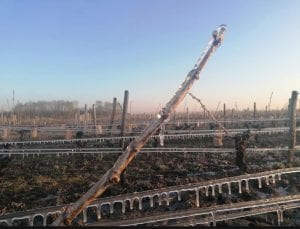 On April 2nd Jean Tatin (Quincy/Reuilly) reported that in low lying Quincy, they had survived the third morning of frost due to their wind turbines and use of aspersion.
On April 2nd Jean Tatin (Quincy/Reuilly) reported that in low lying Quincy, they had survived the third morning of frost due to their wind turbines and use of aspersion.
There was a slight frost here last night (Friday/Saturday). I haven’t seen any reports of damage so far and to date overall the Loire appears to have escaped any serious frost damage. However, there is a long way to go before early May. Fortunately the long range forecast to 17th April predicts warmer weather and no frost. Fingers crossed!!
However, the sales side of wine has dried up. “It is very quiet,” Vincent Roussely of Domaine Clos Roussely in Angé (Cher Valley) told me. Some Loire domaines, such as Benoît Gautier (Vouvray) have stayed open to sell direct to the public – still allowed under the lock-down but others like Domaine Henry Pellé (Menetou-Salon/Sancerre) have closed down.
Ordering on line or by phone is still possible from some producers or oraganisations such as Jo Landron and Domaine Luneau-Papin (Muscadet), Domaine de la Bonnelière (Saumur-Champigny/Saumur), and Vins de Bourgueil, Domaine de la Noblaie (Chinon) is offering free local delivery to nearby towns on specific days next week.
The lock down has meant the cancellation of various local consumer wine fairs including the large annual Fête des Vins Bourgueil in the centre of Tours (21st March) as well as producers’ Portes Ouverts – all good opportunities for producers to both show their wines often some from the latest vintage and to sell direct to the public.
A week after lockdown a new and stricter Attestation was issued (23rd March), which includes a daily limit of one hour’s exercise within a kilometre of where you live. The time you leave your home has to be included on the form.
We were due to return to London on March 26th but soon decided that we were safer in rural France than in London.
Our village is never very busy but now you hardly see anyone with just the occasional car passing. The nearby A5 motorway is empty. When shopping people keep their distance with no sign of panic buying and only one person from a household allowed in. Supermarket trolleys are disinfected after each use.
Fortunately we have a very good butcher, baker and superette just a five km bike ride away. We could be locked down in worse places…
…..
 LM Archer was recently in Burgundy as the outbreak took a grip over Europe, and she shares some thoughts and perspectives of producers there grappling with the rapidly-evolving situation.
LM Archer was recently in Burgundy as the outbreak took a grip over Europe, and she shares some thoughts and perspectives of producers there grappling with the rapidly-evolving situation.
Throughout Bourgogne, growers and négociants are attempting to navigate fast-moving French COVID-19 confinement measures. “I have asked everyone to use their personal vehicle to get around,” says Nicolas Rossignol of Domaine Rossignol-Trapet in Gevrey-Chambertin. “In the vines, it is one to a plot, or else we leave two or three rows between us (two to three meters) if we have to work in the same place. In addition to tying up and fixing trellising, we are also starting to plow. I have two tractors, so each driver has their own.”
Strategies evolve daily, from Chablis to Mâcon. “As soon as we received government recommendations, we implemented specific hygiene measures. Hand washing, hydroalcoholic gel and paper hand towels. Separate toilets,” says Dominique Gruhier and Axelle Roy of Domaine Dominique Gruhier in Epineuil. “In the cellar, there is still the typical work of ageing and monitoring the wines, and preparing for bottling. We are very busy doing our normal routine in the vineyards, and on top of that, some severe periods of frost have come along, which create additional work and stress.”
Hardships continue behind the scenes. “Most Bourgogne winemakers are in the same situation. There are many who are working remotely, and there is a lot of partial unemployment (employees who receive 70% of their salary),” Gruhier says. “Since all restaurants and shops have been ordered to close either wholly or partially, we have no more orders. Additionally, all export orders and planned shipments have been postponed.” To help ease financial strains, Gruhier reports that the government has authorised banks to make cash loans up to 25% of turnover, with government guarantees up to 90% of the loan amount.
Regional ingenuity remains intact, despite obstacles. Rossignol admits that instead of using commercial hand-sanitizer, he dug out some of the ‘head’ distillation liquid from a batch of marc de Bourgogne. “It’s around 80% alcohol, so it’s ideal for disinfecting hands and equipment. In the same vein, we no longer eat together,” he says. “Since we’ve had fine weather, everyone has lunch outside. You just have to go one at a time into the kitchen to reheat your dish.”
“To maintain a social bond, some people have been organising virtual aperitifs, with the help of social networks and videoconferencing,” notes Gruhier. And in a show of solidarity, the French wine industry has initiated the social media campaign #LeVigneContinue as a rallying cry in the vineyards.
“We know the current situation is only temporary, and we are ready to respond to increased demand as soon as it comes,” says Louis-Fabrice Latour, President of the Bourgogne Wine Board (BIVB) and CEO of the Maison Louis Latour. “Managers of wineries and estates are keeping a close eye on when normal production activity can resume, whilst ensuring the health and safety of all concerned.”
…..
Hungary
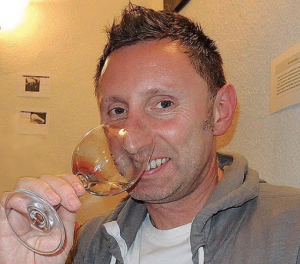 Robert Smyth takes a look at how Hungarian producers are dealing with lockdown and the knock-on impact in the on trade.
Robert Smyth takes a look at how Hungarian producers are dealing with lockdown and the knock-on impact in the on trade.
As of April 4, Hungary had 678 cases and 32 deaths, according to the Hungarian government, although the real number of cases is likely to be much higher due to limited testing so far. Hungary came under international scrutiny last Monday when its parliament passed emergency Coronavirus-related measures that allow Prime Minister Viktor Orbán to rule by decree, with no end date specified. Meanwhile, Hungary is under a kind of soft lockdown – people are not only allowed out for exercise, grocery shopping and for trips to pharmacies, they can also bizarrely still visit hairdressers and manicurists (the vast majority of which are anyway closed). Some wine shops remain open but online sales are taking over as people for the most part keep off the streets, while restaurants have either closed or switched to carry out and home delivers – killing the on-trade wine business.
“It’s tragic, there’s no doubt about it,” says Rob Gilvesy, the Canadian-Hungarian owner of Gilvesy Pincészet, an organic winery on Szent-György Hill in the volcanic region of Badacsony, on the northern side of Lake Balaton, which is Central Europe’s largest lake. “Some 50% of our wines are sold to the on-trade and that channel has dried up, although home delivery has increased.”
Gilvesy adds that Coronavirus presents a real challenge to a lot of winemakers, especially regarding sales. “There’s real uncertainty on the part of buyers. Two out of three of our recent international orders have been cancelled – the wines were all packed up and ready to leave the cellar,” he explains. However, those selling to large supermarkets are doing well, Gilvesy opines, while over in Canada, an important market for his wine, the monopoly is still buying from big clients.
Vineyard work is going on with extra care taken. “Vines are going to grow, we can’t stop that, but we’re keeping to social distancing in the vineyards, while there’s not much work going on in the cellar at the moment,” he says. One bright spot for Gilvesy is the potential of the fledgling 2019 wines, a vintage which he describes as “special” with high quality across the board for all grape varieties – 2018, he describes as a good vintage, although notes there were some problems with Riesling.
Franz Reinhard Weninger, a biodynamic producer with wineries in Balf, in western Hungary, in the region of Sopron; as well as just over the Austrian border in Horitschon, in the Mittelburgenland region, says sales have been around zero for the last two weeks, but is ready to batten down the hatches.
“We learned our lessons from [the financial crisis of] 2008, so I think we’re well prepared. We’re trying to save on spending money and doing a lot of the work ourselves,” he says. He adds that it’s interesting to see how most of the big importers are shocked. “We, the small ones, are rethinking their business, by making bike deliveries and such like,” says Weninger. He also laments that price pressure is already being applied on winemakers. “Some distributors are trying to use this situation to get better payment terms, but we’re not playing this game. I have no wine that will suffer from being in the bottle for a few more months or even years.”
…..
The United Kingdom
Liz Sagues, autho r of A Celebration of English Wine, looks at how the UK’s wine industry has been impacted over the last month.
r of A Celebration of English Wine, looks at how the UK’s wine industry has been impacted over the last month.
Inevitably, Covid-19 is having a massive impact on the wine industry in the UK. But what is encouraging is the trade’s almost equally massive positive response, in terms of initiatives to keep businesses going, use alternative means to encourage sales and ensure through online activity that wine drinkers remain enthused.
The proactive approach of trade body WineGB is a prime example: its website is updated daily with comprehensive information for the UK’s wine producers. And that information is shared publicly. “We felt it important to be reaching out to the whole wine community at this difficult moment,” WineGB marketing manager Julia Trustram Eve told me.
She and her colleagues were even ahead of the government’s agriculture department in producing ‘key worker’ credentials during the stay-home lockdown that is severely limiting movement throughout the UK.
Keeping vineyards and wineries operating is officially recognised as ‘essential’, as too is the alcohol off-trade, so outlets can remain open while all on-trade venues are in forced closure. There is a government-instigated package of financial support for businesses and workers affected by the measures to control the virus spread, but it is not exhaustive. So the Drinks Trust – brand-new title of industry charity The Benevolent – has set up an emergency fund to help some individuals who slip through the formal net.
“The UK wine industry has been hit pretty hard with the Coronavirus crisis, with all vineyard tours and tastings and events cancelled and no on-trade business,” commented Nick Wenman, owner of Albury Organic Vineyard in Surrey and chairman of WineGB South East, the UK’s biggest wine region.
That has meant a rapid rewrite of WineGB’s 2020 marketing plan, making it more digitally motivated, and campaigns such as that for tax relief on cellar-door activity have, inevitably, been put on ice. A planned summer conference on UK wine tourism – crucial to producers – is likely to be delivered online. “Once back to normal we will be right behind putting the tourism message back out,” said Trustram Eve.
A further issue for English vineyards, Wenman points out, is a likely shortage of labour over coming months, as the Romanian workers on which many rely stay at home.
At Chapel Down, England’s largest wine brand, board members and senior staff have taken 20-40% salary cuts and non-contracted capital spending (necessary young vineyard work apart) has been suspended. Such “swift and decisive action” alongside the existing strength of the company, says wines and spirits managing director Mark Harvey, should ensure long-term prosperity.
The social distancing forced on the UK’s drinkers has prompted a boom in alcohol sales, with supermarkets reporting increases of more than 20 per cent and online orders soaring: one leading independent merchant temporarily raised its minimum online spend fivefold to manage demand and another delivered more than 42,000 bottles to customers in two days.
Chapel Down has seen this rise too, and should it continue, Harvey notes, “the off-trade sales and online growth of our wines would more than make up for the loss of on-trade wine sales”.
Spirits companies are also hit by the lockdown, but round the UK a number of gin and whisky distilleries are converting the alcohol they produce into hand sanitiser, giving it to customers, selling it for charity or donating it to health care workers or local hospitals.
Many initiatives are being directed at consumers to keep both interest and sales healthy. Digital tasting experiences include the weekly #englishwinenight, launching on April 10, and wine therapy and meet-the-grower sessions from honestgrapes.co.uk; there is detailed information on home-delivery options (jancisrobinson.com, lescaves.co.uk, WineGB social media Shop Local campaign are among providers); free or reduced delivery charges (from many UK vineyards, some linking with other local food and drink businesses); and discounts for health and care workers.
In this rapidly changing situation, though, much relies on bonded warehouses continuing to supply and delivery companies staying on the road.
SOUTHERN HEMISPHERE
While the Northern Hemisphere is in the middle of spring, the Southern Hemisphere was hit with the Coronavirus crisis right in the middle of harvest. Some of our members share what’s happening in the Southern Hemisphere, and how winemakers are coping with these exceptional circumstances.
New Zealand
 Tom Jarvis gives us an overview of the current state of Coronavirus play in New Zealand. Based in Auckland, where he writes for Wine-Searcher, Tom looks at how the industry at large has been affected by the pandemic so far.
Tom Jarvis gives us an overview of the current state of Coronavirus play in New Zealand. Based in Auckland, where he writes for Wine-Searcher, Tom looks at how the industry at large has been affected by the pandemic so far.
New Zealand is on Alert Level 4 – the highest level, on the basis that the threat is not currently contained. Figures as of 9am on 31st March were 600 cases confirmed, with 48 new infections in the last 24 hours, and one death.
Wine Production
The primary industries have certainly been aware (if to varying degrees) of the threat that the virus might hold since the turn of the year. Obviously, it is the larger companies and multinationals which have been best placed to prepare.
Wineries and wine estates have been listed as essential businesses. The various production associations are emphasizing the positive, and asking producers to do the same, expressing relief that they can still operate. I have read some complaints that more could have been done by the MPI (Ministry for Primary Industries) since January. But there seems to be an overall desire to see the glass as half full and avoid accusations of exceptionalism.
The decision not to abandon the vintage has come under attack from outside the industry, however. Wineries stay open 24/7 and workers are transported together between vineyards and across regions. Accommodation options have also worried some local residents.
Many casual harvest staff and cellar hands have either failed to arrive or were asked to go through two weeks quarantine before commencing contracts. Last week, one contract winery gained adverse publicity for losing track of a group of newly arrived French pickers.
Some companies have struggled or will struggle to get their fruit in. Meanwhile managers are working through a raft of requirements from the MPI to ensure safety. Most wines are being made by reduced teams, many working in isolation from families.
Tasting rooms and restaurants have been closed. In some cases, the hospitality team have been usefully deployed elsewhere in the business.
The larger regions, such as Marlborough, who have the highest rate of machine harvesting have fared best in getting fruit to the presses. However, in Central Otago there is more hand picking and most operations are just starting their pick during the full lockdown. In general, these are smaller estates producing higher-priced wines so they will be among the hardest hit.
Wine Sales
As of 25th March, contactless delivery of alcohol from an online business was deemed an essential business. Some online channels which had closed have now recommenced trading.
Wineries are therefore able to sell direct via ecommerce. But super premium wines are not what is driving alcohol sales at a time of wage suspensions and layoffs.
Bricks and mortar merchants are closed throughout the vast majority of the country, leaving supermarket sales only. The latter is not an option in West Auckland and Invercargill, where regional trusts control liquor sales, and so some of their off-licences are trading under restrictions.
Many smaller operations rely heavily upon on-sales within New Zealand. No restaurants or bars remain open during the lockdown.
The loss of export markets is a massive blow in a country with a modest domestic customer base. Three weeks ago, press reports suggested prospects for sales to the USA and Europe seemed reasonable, but since then many more restrictions have been applied to the supply chains in these regions.
One boutique wine estate owner tells me that many operations with an Asian focus will have no export sales at all to the region throughout 2020. China seems to have reopened for exports, but I suspect it is the multinationals who are best placed to benefit.
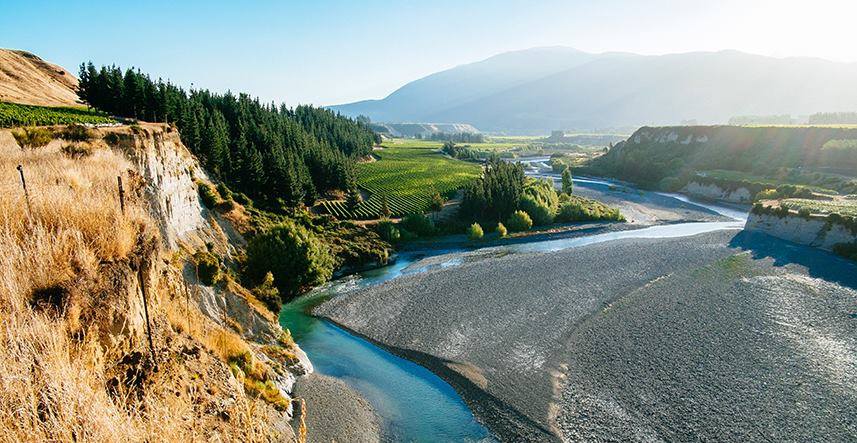
Wine tourism grinds to a halt but harvest continues
 Britt and Per Karlsson of BK Wine were recently touring New Zealand with a group of wine tourists when the news of lockdown came. They share their experience of visiting the winemakers of New Zealand during mid-harvest and mid-Coronavirus crisis.
Britt and Per Karlsson of BK Wine were recently touring New Zealand with a group of wine tourists when the news of lockdown came. They share their experience of visiting the winemakers of New Zealand during mid-harvest and mid-Coronavirus crisis.
In New Zealand, many of the wine producers were in the middle of the harvest when the message came on 23rd March about total lockdown of the country two days later. We had just finished a 16-day wine tour with a group of 22 people and luckily most of us have managed to get back home by now. But it was an adventure.
At our last lunch together, on 23rd March at the superb Carrick Wines in Central Otago, Neil, our host at the restaurant was really worried about the harvest and was afraid that the grapes would just be left to shrivel on the vines due to the new isolation measures.
So, for the producers the relief was great when they were told that the harvest, despite everything, could be continued and completed. “Farming and viticulture have been defined as essential industries, so we can proceed. We have to take a lot of precautions with any workers, but it is fine,” says general manager Olivia Doonan, at Tupari Wines, in the Awatere Valley in southern Marlborough.
Ally and Dominic Mondillo, owners and winemakers at the Mondillo Winery in Bendigo, Central Otago, confirm that New Zealand is in complete lockdown. “We have been given the approval to pick our grapes,” says Ally, “of which we are extremely grateful, however the atmosphere surrounding the rules and regulations is a huge task, but our focus is to get our small team of 15 people out the other side and everyone stays well and healthy. We usually have twice this number picking so it is a slow task ahead of us – each day we have been blessed with sunshine, so it keeps everyone happy and focused, away from the troubles that surround us today. New Zealand was very quick to implement our shut down, so I think this will help the country.”
As the quality this year looks to be exceptionally good, of course the producers are particularly happy that they can proceed with the harvest. We saw many happy faces during our tour here in March. Jenny Dobson, winemaker at Unison, in Hawke’s Bay, says: “We started harvesting very early this year, as early as 3rd March. It has been an interesting season with fine weather but very dry, which is unusual for New Zealand.”
Also for Larry McKenna, the legendary winemaker at Escarpment in Martinborough, the harvest began in early March, earlier than he has ever encountered during his long winemaking career. He expects vintage 2020 to be superb.
Lucie Lawrence, winemaker at Aurum Wines, in Central Otago, hasn’t started harvest yet. “But”, says Lucie, “we are lucky to have been allowed to harvest. Probably next week.”
…..
South Africa
 Angela Lloyd, one of our Members who is resident in the Cape, shares a perspective from South Africa – where winemakers were told mid-vintage that they had to stop making wine!
Angela Lloyd, one of our Members who is resident in the Cape, shares a perspective from South Africa – where winemakers were told mid-vintage that they had to stop making wine!
The first case of Covid-19, the disease caused by the Corona virus, in South Africa, was recorded on 5th March. By the 22nd, President Ramaphosa announced a total lockdown from midnight 26th March to 16th April. Under amended regulations of the Disaster Management Act, among other items, only food products, including non-alcoholic beverages, are listed as essential; manufacturing and trade of alcoholic products have to stop during lockdown.
This terrible news for the wine industry came 24 hours before lockdown with harvest still in progress, cellars full of fermenting and unstable wine, and wine ready for export and local sales.
Vinpro, the industry body representing 2,500 wine grape producers and cellars, together with other stakeholders, made an urgent application to the government for dispensation to complete the harvest and cellar work, and also allow exports.
Much to collective relief, ‘harvesting and storage activities essential to prevent the wastage of primary agricultural goods’ was added to the list of essential services. Those harvesting and working in the cellar are also considered essential. The issue of exports remains under discussion with the government.
The prohibition of alcohol sales has resulted in the closure of restaurants, bars and liquor merchants; while supermarkets, which remain open for basic food supplies, may also not sell alcohol.
The timing of the lockdown has affected winemakers in different ways. Francois Haasbroek of Blackwater Wines, had finished harvest but has tanks of still-fermenting wine. These he is looking after by himself, having sent his workers home for the lockdown; “It reduces risk and the nightmare logistics of getting them to and from the cellar.’ Francois’ home in Paarl is around 10 kilometres from his cellar; at a police roadblock en route, he has had to show required documents permitting him to make this journey. The same would apply to workers.
Francois’ main concern is disruption to the whole value chain, which affects cash-flow; this doesn’t stop invoices flowing in from growers (he and many other producers don’t own vineyards). Many small producers are going to be hit hard, some probably unable to survive.
Richard Kershaw MW of Richard Kershaw Wines is based in Elgin, where he works in two separate cellars; he admits the moving target of essential services has proved challenging and nerve-wracking.
He has Syrah still hanging, with harvest due this week (2nd April). In the normal course of things, the winemaking process through to the end of malolactic fermentation when he first adds sulphur, can take two months. The uncertainty of the government’s interpretation of ‘harvest’ and ‘cellar duties’, as well as the actual length of lockdown, might mean earlier sulphuring to ensure the wine is safe. Regular tasting of unbottled wines from both cellars is also due; “Can I transport them to another venue to taste or send samples for analysis?” There are still grey areas without conclusive answers.
There is light at the end of the tunnel; many are feeling positive about Harvest 2020. Francois Haasbroek says it’s looking good for both whites and reds with volumes up over the past three (drought) years. For Richard Kershaw, “Chardonnay is looking stunning with amazing flavours, great acidity and lower pHs than normal thanks to a cooler vintage.”
…..
South America
 Amanda Barnes reports on how wine countries in South America have been coping with the Coronavirus and how it has impacted the industry and its winemakers who were mid-vintage.
Amanda Barnes reports on how wine countries in South America have been coping with the Coronavirus and how it has impacted the industry and its winemakers who were mid-vintage.
The wave of Coronavirus couldn’t have come at a more inopportune time for the wine industries in South America – right in the middle of vintage. Chile and Argentina both have rather long harvests, running from late January through to early May most years, and the global crisis began unfolding only a short month into vintage.
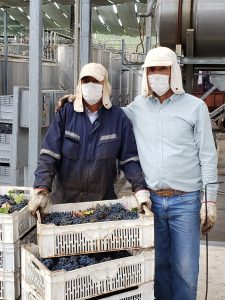
A curfew was set in place from 18th March onwards and lockdown has been set in place in certain cities and the most populated areas, however agricultural regions have less restrictions and winemakers are being considered key workers in a critical sector, able to continue with their work as needed. Harvest also came relatively early this year, meaning that many of the grapes have already been picked. “A hot vintage and early harvest can be very challenging, but in the case of this year it was a blessing in disguise,” says Emily Faulconer, winemaker at Viña Carmen based in Maipo – 30 minutes from Santiago city. “We managed to get all our grapes in before the total quarantine happened in Santiago.”
Uruguay, for its rather small population, has a relatively high number of cases with over 300 recorded so far – which can mainly be traced back to one guest spreading the virus at a glamorous wedding party in March. Winemakers have fortunately finished most of their harvest, with the majority of grapes for their longest-hanging variety, Tannat, being picked last month. “We are finishing our last ferments now,” says winemaker Santiago Deicas of Familia Deicas in Canelones, Uruguay. “And for now we’ve had sufficient people to work in the winery, and have given paid leave to everyone in the vineyard while our administration workers are all working from home. In Uruguay we are very conscious of what could come to pass here and so we are all respecting the government guidelines.”
Although most of South America’s main wine countries seem to have controlled the curve and brought in restrictions in the early stages, Brazil’s government has taken a completely different approach. While President Bolsonaro has been telling residents to continue as normal and that Coronavirus is “just the sniffles”, residents have been taking their own containment measures into their own hands. Harvest is fortunately over in the main wine regions of the south, and most wineries have taken it upon themselves to close for tourism in the meantime.
ASIA
India
 Ruma Singh reports on India’s lockdown and how that has effected the wine industry, including winemakers who have had their harvest cut short by restrictions.
Ruma Singh reports on India’s lockdown and how that has effected the wine industry, including winemakers who have had their harvest cut short by restrictions.
In India, the Prime Minister announced a 21-day total lockdown starting 24th March. In all, the numbers of Covid-19 positive cases are at 2,301 at the time of writing, with 56 deaths confirmed (official figures). No one is permitted to leave their homes except to buy essential provisions or medicines at specifically notified hours. All stores and establishments have been ordered to shut, including all stores selling wine and spirits. It is worth mentioning that in India, sales of all liquor comes under the purview of state governments, not the central, and each of India’s 29 states along with seven union territories in India have adopted different approaches when it comes to taxing and regulating liquor. However, during the lockdown period, only two states, Punjab and Kerala, have declared liquor as part of ‘essential commodities’ and are permitting sales, albeit with restrictions.
In India, most wine production takes place in two states: the Nashik region in Maharashtra (western India) and several areas in Karnataka (south India), including Bengaluru.
Harvest begins in early January and continues until early April (for the Karnataka region), so most of this year’s harvest was completed before the lockdown notification on 22nd March. Grover Zampa Vineyards, India’s second-largest wine producer, with vineyards and production in both of India’s wine producing states – Maharashtra and Karnataka, began harvesting in the first week of January and found themselves with grapes left to harvest (about 5% of red grapes, primarily Cabernet Sauvignon) when the announcement was made. “Most of these vineyards belonged to our long-term contracted growers,” says Manjunath VG, Vice President Vineyards, Grover Zampa Vineyards. “We stopped harvest as soon as we received the order, as taking care of our workers’ interests is vitally important for us.” Within days, in response to appeals from wineries put forward by the All India Wine Producers Association, the state governments gave permission for the harvest to be completed with strict pre-conditions of hygiene and safety, in order to aid farmers. About 50% of the workers were permitted to return to the vineyards, where the harvest and crushing was completed in three days, says Manjunath.
Retail is a different story. Tonique, the 15,000 sq feet wine and spirits boutique which opened in the south Indian tech hub Bangalore about six months ago, is currently closed in keeping with government orders. No home delivery of wine or spirits is permitted by state government law, so, as Tonique general manager GLN Das puts it, “It is a wait-and-watch situation for us.” Tonique, with over 900 wine labels of imported and Indian wines had seen sales of wine double in the last six months, adds Das. Interestingly, during the week before the lockdown was announced, sales in store had shot up 150%.
At the time of writing, the government says the total lockdown will be enforced until 14th April, 2020.
…..
China
 Janet Z Wang, author of The Chinese Wine Renaissance, reports on how China has been coping with the crisis. As the first country to suffer from the disease, she looks at how things have progressed since its discovery in December 2019 and what wine businesses and wineries are doing to survive the storm.
Janet Z Wang, author of The Chinese Wine Renaissance, reports on how China has been coping with the crisis. As the first country to suffer from the disease, she looks at how things have progressed since its discovery in December 2019 and what wine businesses and wineries are doing to survive the storm.
China’s wine imports dropped 30.4% by volume and 28.3% by value in January and February 2020, versus the same period last year (customs data).
Over half of China’s 1.4 billion population went into self-quarantine around the Chinese New Year (24th January 2020) due to the emergence and escalation of COVID-19. Traditionally, the week following CNY are the most active period when people visit close family and friends. As a result of the widespread lockdown, the gifting season was abruptly cut short, though sales leading up to CNY were normal, but over 50% of gifts bought were not given out. Many wine retailers estimate around 80% of stock overhang, which would take them beyond Q2 before restocking. Ironically, ample stocks mean that recent increases in international freight costs and supply disruptions from elsewhere will not adversely impact China’s import needs for at least the first half of this year.
Within the Chinese wine trade, many are speaking of the biggest ‘reshuffling of the deck’ and ‘skimming off the foam’ since 2011 (Bordeaux en-primeur crash followed by China’s anti-corruption initiatives) – euphemisms for the waves of bankruptcies expected to manifest, especially among small- and medium-sized distributors and retailers. Around 250,000 Chinese companies have already filed for bankruptcies in the past two months.
Online becomes a lifeline
Overall wine sales were down by 40% in January and February. However, behind this headline figure, there are losers but also survivors, even ‘winners’. Whilst many brick-and-mortar wine shops and restaurants lamented about sales being down by 99.9% (reads more like the amount of germs that Dettol promises to wipe off!), several established online retailers have seen over a 120% increase in sales in the same period.
In China, wine drinking is a social activity, and very few people would drink wine alone at home. That is why ‘Cloud wine tasting’ sessions, either casually among friends via WeChat video chat, or being guided by experts or influencers on live streaming platforms (usually with the aim of selling wines), have been gaining more traction, especially among urbane millennials. There is also the livestreaming of classes with wine experts and mixologists to teach people about wine and making cocktails at home. The hope is to cultivate wine consumption at home beyond the quarantine period. Isabella Gao – owner of Beijing’s The Merchants wine bar and restaurant, says she had to divert to takeaways and online sales to stay afloat. “Luckily for me, I am also an importer and agent for Zalto and Coravin and both have sold like hot cakes, and I cannot keep up with demand. This is so interesting, it means people are drinking at home, and drinking in style.”
Production not impacted
Production has not been significantly impacted. “In China, this period after the Chinese New Year is light season for both the vineyard and for sales,” says Wang Fang, owner of Ningxia’s Kanaan Winery, “plus vineyards tend to be in remote parts of China with sparse population around them, so the impact on our work is limited. The silver lining is that I have had the time to reflect, and explore livestreaming and online channels. I have personally done four livestreaming sessions on our own T-Mall flagship store during lockdown.”
Mr Tian Jiang of Martin Vineyard, in Hebei province, says, “Vineyard work is long term, the virus is here for the short term. We are doing all our work in the vineyard and winery as in normal times. Sales certainly will be impacted. But this could be a good chance for Chinese domestic wines, as the supply outlook is more certain and prices more stable.”
Mr Zhang Yanzhi, owner of Ningxia’s Xige Estate pointed out: “the pressure is mostly on cashflow. Investment and work cannot completely stop in the vineyards and wineries, but sales may be down for a while. So careful management of cashflow is key”.
Looking beyond
- Acceleration of existing trends
China is already the largest online wine and spirits market in the world. The post-pandemic world will amplify the significance of e-commerce and is likely to accelerate further the onset of ‘New Retail’ – a concept that morphs and integrates the offline and online business models and consumer experiences (which I have written on in more detail for Meininger’s Wine Business International).
The trend for premiumisation will also be underscored as people focus even more on health and quality. Premium-brand wine and spirits, including whisky, baijiu and health-tonics are likely to benefit.
- Consolidation vs. fragmentation
There are two diverging predictions about China’s market outlook. In the one camp, analysts are expecting consolidation of both brands and channels. This trend would favour big players, who are well positioned to suck up the market share left behind by SMEs unable to survive this ‘black swan’ event. These larger players have been busying with PR activities during the lockdown with online streaming contents and large donations to the frontline efforts in Wuhan. The importance of trust in brands and distributors will also favour consolidation. In the other camp, some professionals believe in further fragmentation of the market as generational and technological trends – that younger consumers want to seek out characterful brands with stories, they enjoy time-limited ‘Groupon’ style deals, or demand personalised purchases and exclusive tasting experiences. The jury’s still out, but both camps will fight tooth and nail in ever competitive market conditions.
- Old habits won’t change
Although much has been said about live-streaming and e-commerce during the lockdown period, some professionals are not convinced that they will fundamentally change people’s drinking and spending habits post crisis. Mr Zhang Yanzhi, owner of Xige Estate in Ningxia and founder of importer/distributor Easy Cellar, believes that people will quickly revert back to old habits: “we mustn’t underestimate the importance of traditional channels: shops, restaurants and personal experiences. Be under no illusion – online is no saviour for the enormous loss of physical sales in the past months”. However, he adds a positive note: “Overall this crisis doesn’t change fundamentals, it just accelerates what will happen and clears out weaker and unprofessional players sooner. Quite simply, there is only one big trend: the Chinese wine market is only going to grow.”
…..
Japan
 Megumi Nishida reports from Japan, where life seems to be continuing as normal on the surface, but fractures are appearing underneath.
Megumi Nishida reports from Japan, where life seems to be continuing as normal on the surface, but fractures are appearing underneath.
Surprisingly, nothing has been ‘banned’ or ‘locked down’ by the Japanese government, which is just requesting the public to practice ‘self-restraint’ with regards to going out. That’s because it doesn’t want to have to compensate for banning it. Instead of forcing us to be in self-isolation, they’re giving us the freedom to go out and trying to solve the problem ourselves with mutual surveillance and social pressure. (This is a VERY Japanese way.)
It’s been two months since Covid-19 started spreading here, and the government announced this week that it would provide two cloth masks per household. Until then, they had considered handing out coupons for Japanese-beef, fish and travel that would have benefited their interests, instead of handing out masks. Can you believe it?
People are living almost the same life as they did before. Of course, there are fewer people going out. But restaurants, department stores, cinemas and gyms are still open. It is still difficult to buy toilet paper, masks and sanitary goods, but we can buy other things as usual. There are still many people taking packed trains to work every morning. However, for some reason, the infection and mortality rates in Japan have remained surprisingly low.
Schools have been closed, but in some areas school starts next week (in Japan the new term starts in April).
The food and beverage industries, such as restaurants, concerts and theatrical performances, have suffered greatly. Since this month, many restaurants started closing until the middle or the end of April. Libraries and museums have also been shut down.
As for the current state of wineries in Japan, one example is Grace Winery, which many people would know as pioneers and a very successful winery, not only in Japan but also around the world. According to winemaker Ms. Ayano Misawa, “Winery tours are open by appointment only, with care taken to limit the number of people, with disinfection and ventilation. We are doing the same work in the vineyards and cellars as before. Sales remain good for the majority of restaurants and exports are not badly damaged at the moment as the Asian market has been recovering”.
On the other hand, the smaller wineries, which have been established over the past decade or so, seem to be struggling. According to Mr. Kiyoshi Seto, the owner of Seto Winery: “The small wineries have been raising their profiles and expanding their sales networks through local wine events and in Tokyo, but now all of those events have been cancelled… so we are having trouble finding people to sell to.” He also said, “small wineries like us are also focused on wine tourism, but very few visitors come now.”
In the last ten years, the numbers of wineries have been increasing rapidly, and this is a time of great trial for them.
NORTH AMERICA
USA
 L M Archer looks at the different coping mechanisms and reactions of wineries and wine businesses on the West Coast of the US, as the country comes under increasing lockdown and restrictions.
L M Archer looks at the different coping mechanisms and reactions of wineries and wine businesses on the West Coast of the US, as the country comes under increasing lockdown and restrictions.
California: Pivot in Place
“Pivoting in place” is proving to be the new catchphrase for US West Coast bar, restaurant and wineries impacted by COVID-19 lock-down restrictions.
Rob McMillan, EVP & Founder of Silicon Valley Bank, provides some harrowing statistics about the current state of California winery clients. “We have 475 wine industry businesses we support, and have been in close contact with them these past few weeks as we move through this crisis,” says McMillan. “With direct phone and email contact, I’d estimate 90% of wineries had layoffs of hourly tasting room staff. Not all have laid off 100% of their hourly staff, but the vast majority made cuts to staff the first week after the tasting rooms were ordered closed. Probably 30% have laid off a portion of their salaried staff.”
Remaining ‘repurposed’ tasting room staff now deliver cases of wine locally to homes, perform telelesales, and/or execute winery production duties. “The average winery has about 30% of their sales through the tasting room, and 20% through restaurants,” says McMillan. “Telesales have given a minor lift to those who have undertaken them, but I would estimate less than 2% of average annual sales for the individual winery. So taken as a whole, wineries have lost between 40% to 60% of total sales, but it depends on the winery.”
DtC (Direct to Consumer) data emerges as a potent weapon on the new COVID-19 battlefield. “Facing an extinction-level event, our industry is rapidly pivoting to learning to use digital tools to sell and communicate with customers,” says Paul Mabray, CEO of data firm Emetry.io. “Since most wineries don’t have processes and programs fully staffed, it’s a steep learning curve for many with lots of bumps ahead. It also requires most wineries to re-evaluate their value exchange and relationship with their customers. But the silver lining of this tragedy is that is has catalyzed our industry to build modern, healthier, and more sustainable business practices that will endure post-pandemic.”
For many California wineries, those ‘bumps in the road’ look more like mountains. “COVID-19 has primarily impacted the hospitality/sales part of our business, rather than vineyards and the winery operation,” says Donald Patz of Donald Patz Wine Group. Patz operates three different California wine brands. “Obviously, we can’t run a tasting room,” says Patz. “The impact to our sales has been significant, with a lot of restaurants closed. I think the temporary answer is not so much expecting everyone to order wine shipped to their homes, but to work with local retailers…It’s a real adjustment.”
An uptick in at-home alcohol consumption looms large. “When we reviewed data, we were surprised at how much alcohol levels had increased,” says Keith Nothacker, President of Bay-area portable breathalyzer company BACtrack.com. “We also saw how alcohol consumption patterns changed immediately. People are reaching higher BACs on what were previously lower drinking days – Sunday, Monday, Tuesday.”
Consumer tracking confirms this trend. “Our latest weekly total U.S. off-premise data reveals that alcoholic beverage sales increased during the week ending 21st March 2020 at even a faster pace than the previous week,” says Greg Doonan of Nielsen. “Total U.S. Beverage Alcohol online measured increases were out of the park – up 243% vs. the same period of a year ago. And wine continues to dominate online share – 71% of total Beverage Alcohol sales.”
Washington: Pivot to Picks Ups
For Seattle-area bars and restaurants, business has moved from sit-down to pick-up. “We had to make the difficult but necessary decision to suspend operations in all but three of the HRG locations,” says Alexandra Stang, Beverage Director of Hitchcock Restaurant Group (HRG), which includes eateries Hitchcock, Bruciato, and Bar Taglio. In response, Stang created the Pandemic Wine Club (PWC) program, which serves up phone consultations, personalized wine selections, and sanitized pick-ups and deliveries. HRG also proffers Hitchcock CSA (Community Supported Agriculture) to pandemic customers wishing to purchase a box of food for a family in need. HRG not only delivers the box, but also matches the contribution.
”In Washington, in-person tastings are no longer allowed, but wineries are still permitted to offer to-go sales, curbside sales and pick-ups, and deliveries,“ says Heather Bradshaw, communications director for Washington State Wine Commission. “We’ve seen wineries get really creative on social media, and many are engaging with customers in new way by offering live videos, virtual tastings and online happy hours.”
Riding the social media wave, Walla Walla Valley Wine Alliance Wine Month launched their inaugural Walla Walla Wine Month online in April utilizing hashtag #WallaWallaValleyWineMonth. “As spring arrives in the Valley, and we’re faced with the reality that it isn’t accompanied with an abundance of tourism like usual,” says Robert Hansen, Executive Director of the Walla Walla Valley Wine Alliance, “We believe, now more than ever, that declaring April as a month to share the unique qualities of the Walla Walla Valley is the right thing to do.”
Oregon: Finding a New Rhythm
COVID-19 restrictions have been felt throughout Oregon’s renown robust wine and food scene. “Sales and marketing efforts have been the most deeply and quickly impacted, with restaurants both here in Portland, nationwide and globally essentially shut down, and no longer purchasing wine,” says Kate Norris, owner-winemaker of Division Wine Making Company, and Willamette Valley Wine Association board member. Norris has cancelled sales trips, discussed virtual tastings with distributors, and tried to “find a rhythm in this new landscape”.
“Our US distribution partners are being highly impacted in terms of sales that are now for the most part only happening in the off premise/retail sector – which, of course, then affects our winery’s overall sales numbers and projections for the year. While direct to consumer shipping is up for us, it in no way covers the immense loss of distribution sales we are experiencing.”
Adjustments vary winery to winery. “We are cleaning door knobs and surfaces three times daily, checking employees temperatures at home and work, and constantly redefining what safety means to us,” says Ian Burch, winemaker at Archery Summit in Dayton, Ore. “While the tasting rooms are closed, we have began to use Zoom to connect with our customers.”
“In one day, we had to pivot to a same-day delivery and online wine retail model” adds Jessica Mozeico, winemaker and owner of Et Fille Wines in Newberg, Ore. “This is allowing us to reach new consumers that previously weren’t frequently driving down to the Willamette Valley to discover new tasting rooms.” Mozeico refuses to budge on two things. “My top priority is keeping stable income for my team,” she says. “They are the life of my brand, and they have rent to pay.”
Mozeico also refuses to bail on her growers. “It is tempting to scenario plan around reducing 2020 harvest costs due to reduced revenue,” she says, “but we have been in business for 17 years, and treating our grape growers as fairly as I would want my customers to treat me during challenging times is critical to the sustainability of our business.”
“COVID-19 has touched our lives and affected our work on almost every front,” concludes Tracy Kendall, associate winemaker at Nicolas-Jay. “We will get through this. Winemaking teaches you about cycles of challenge and that no matter how difficult, it always ends. You always move onto the next season, the next vintage, the next challenge. The beauty of wine will carry us through.”

